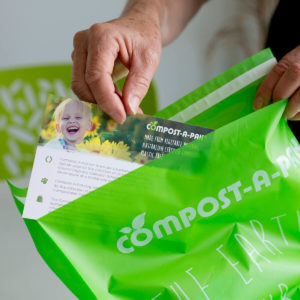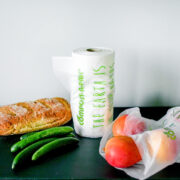Historic ban triggers awareness on what’s really ‘green’
 This week South Australia’s historic ban on single use plastic products starts, with items such as straws, stirrers and cutlery now banned, however that’s just the start. Next year the ban will expand to polystyrene containers, and … drum roll please … oxo-degradable plastic products. We are really excited to see oxo-degradable plastics being banned, and hopefully it will raise awareness of their risks and trigger further bans across Australia.
This week South Australia’s historic ban on single use plastic products starts, with items such as straws, stirrers and cutlery now banned, however that’s just the start. Next year the ban will expand to polystyrene containers, and … drum roll please … oxo-degradable plastic products. We are really excited to see oxo-degradable plastics being banned, and hopefully it will raise awareness of their risks and trigger further bans across Australia.
To our horror our Compost-A-Pak products are often compared to oxo-degradable products, mainly due to the success of marketing strategies which make Oxo-degradable seem ‘green’, however this is far from the truth.
For nearly 15 years we have been campaigning for more transparent ‘honest’ labelling, and encouraging our customers to research and better understand what they are buying. Below we have broken down some popular marketing terms including Oxo-degradable and provide our take on what’s really green, and what to look for when you are purchasing.
Australian Certified Home Compostable AS5810 – RECOMMENDED
- Products with this certification, like Compost-A-Pak® are proven to breakdown in a home compost with no harmful residue. They are plastic free!
- The Australian Certification (AS5810) is one of the strictest certifications in the world, and so to be accredited, products need to pass an additional toxicity test. As such you can be confident bags with this certification will breakdown as nature intended, with no harmful residue or micro plastics.
- Given we compost our bags and use the resulting compost for our family vegie patch, we always look for the AS5810 or AS4736 certification before purchasing any compostable products.
Australian Commercial Composting Standard AS4736 – RECOMMENDED
- An Australian Certification confirming that the products are suitable for Commercial Composting Facilities such as those used by councils as part of FOGO programs. You can be confident products with this certification, like Compost-A-Pak® are made of plant based materials and are plastic free.
- To be accredited to this standard, compostable products must biodegrade at least 90% within 90 days in a commercial composting facility. Despite being so durable, the Compost-A-Pak® products were shown to biodegrade 99% in half the time!
Oxo-Degradable – SOON TO BE BANNED, THIS IS ONE TO AVIOD.
- These materials are usually plastic based with added chemicals to speed up the time in which the plastic breaks down with heat, oxygen and UV light.
- Whilst the material may disappear from sight, it breaks down into microplastics. In contrast, compostable products breakdown at the molecular or polymer level.
- Microplastics are considered by many to be more dangerous to the environment than larger pieces of plastic, as they so easily spread into the environment as pollution, and can enter our food chain. Their effect on human health is still being studied by scientists, who estimate we may be ingesting up to a credit card of plastic every week! Definately one to avoid!
Degradable
- For a product to degrade, it simply means it will breakdown into smaller components.
- Usually plastic based, often this degrading will occur faster because the plastic has been treated with chemicals to speed up the process.
- Alternatively, these products can also be a combination of plant based and plastic made material.
- In both these cases the resulting material is micro plastics, which should be avoided given the pollution risks.
Landfill Degradable
- Similarly, these bags are usually a plastic based material which breaks down more quickly given chemicals or plant based additives.
- Interesting, when placed in Australian Landfills, often the materials are compressed with other wastes to reduce the oxygen content, and so slow down the rate at which all materials breakdown given this process actually adds to carbon dioxide emissions and the leeching of pollutants including microplastics.
- Whilst a clever marketing term which sounds environmental, we believe this is one to avoid.
Biodegradable
- A biodegradable product relies on organisms rather then chemicals to break down the product into smaller components. Often however, material promoted as bio-degradable contains a combination of plastics and plant based products. As such, whilst the bags do breakdown faster than they normally would, they may breakdown into microplastics.
- If products do not have Compostable Certification, it’s best to assume they are not completely organic and so contain either toxins or a proportion of plastics.
Flushable
- Usually made from a polyvinyl alcohol, these solutions are being presented as a water soluble bag which provides a way to save plastics and dog waste from Landfill. Unfortunately the bags are proving less water soluble than promised, and so are causing significant issues in our sewer system. When trapped, they are then removed at enormous expense, and placed into landfill.
- Despite some recent rebranding of a key brand following a War On Waste Report, these bags are still suggesting they can be flushed. This is another one to avoid!
What ‘eco’ marketing terms have you questioned? We would love to hear your feedback and experiences.


